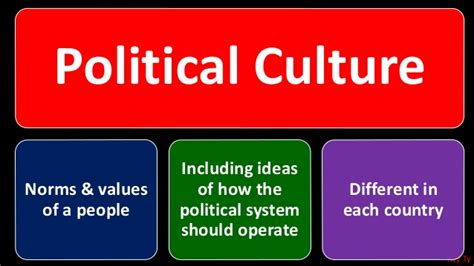Political culture is the shared beliefs, values, and norms that shape the political behavior of a society. It is a complex phenomenon that is influenced by a variety of factors, including history, geography, and religion. Political culture can be either positive or negative, and it can have a significant impact on the way that a government functions.

Characteristics of Political Culture
There are a number of different characteristics that can be used to describe a political culture. Some of the most common include:
- Trust: The level of trust that citizens have in their government.
- Tolerance: The degree to which citizens are tolerant of different political views.
- Participation: The level of participation that citizens have in the political process.
- Legitimacy: The degree to which citizens believe that their government is legitimate.
- Equality: The degree to which citizens believe that they are treated equally under the law.
Types of Political Culture
There are a number of different types of political culture. Some of the most common include:
- Authoritarian political culture: In an authoritarian political culture, citizens have little or no trust in their government. They are not tolerant of different political views, and they do not participate in the political process. The government is seen as illegitimate, and citizens do not believe that they are treated equally under the law.
- Democratic political culture: In a democratic political culture, citizens have a high level of trust in their government. They are tolerant of different political views, and they participate in the political process. The government is seen as legitimate, and citizens believe that they are treated equally under the law.
- Traditional political culture: In a traditional political culture, citizens defer to traditional authority figures and institutions. They are not likely to question the status quo, and they do not participate in the political process. The government is seen as illegitimate, and citizens do not believe that they are treated equally under the law.
- Modern political culture: In a modern political culture, citizens are aware of their rights and responsibilities. They are likely to question the status quo, and they participate in the political process. The government is seen as legitimate, and citizens believe that they are treated equally under the law.
Why Political Culture Matters
Political culture is important because it shapes the way that a government functions. A positive political culture can lead to a stable and prosperous society, while a negative political culture can lead to instability and conflict.
Some of the benefits of a positive political culture include:
- Increased trust in government: When citizens trust their government, they are more likely to comply with the law and to participate in the political process.
- Increased tolerance of different political views: When citizens are tolerant of different political views, it is more difficult for extremists to gain power.
- Increased participation in the political process: When citizens participate in the political process, they have a greater say in how their government is run.
- Increased legitimacy of government: When citizens believe that their government is legitimate, they are more likely to obey the law and to cooperate with the government.
- Increased equality under the law: When citizens believe that they are treated equally under the law, they are more likely to feel that they are part of the political community.
Common Mistakes to Avoid
There are a number of common mistakes that can be made when discussing political culture. Some of the most common include:
- Overgeneralizing: It is important to avoid making generalizations about an entire political culture. There is a great deal of variation within any political culture, and it is important to take this into account when making any generalizations.
- Assuming causality: It is important to avoid assuming that a certain political culture causes a certain type of government. There are many factors that can influence the type of government that a country has, and political culture is just one of them.
- Ignoring the role of institutions: It is important to remember that political culture is not the only factor that shapes the way that a government functions. Institutions also play a significant role. It is important to consider the role of institutions when discussing political culture.
Political culture is a complex phenomenon that has a significant impact on the way that a government functions. It is important to understand the characteristics of political culture and the different types of political culture. It is also important to avoid the common mistakes that can be made when discussing political culture. By understanding political culture, we can better understand how our government works and how we can improve it.
Additional Resources
Tables
| Country | Political Culture | Type of Government | Level of Trust in Government |
|---|---|---|---|
| United States | Democratic | Constitutional republic | 73% |
| China | Authoritarian | Communist state | 79% |
| Russia | Traditional | Federal semi-presidential republic | 30% |
| India | Democratic | Parliamentary republic | 63% |
